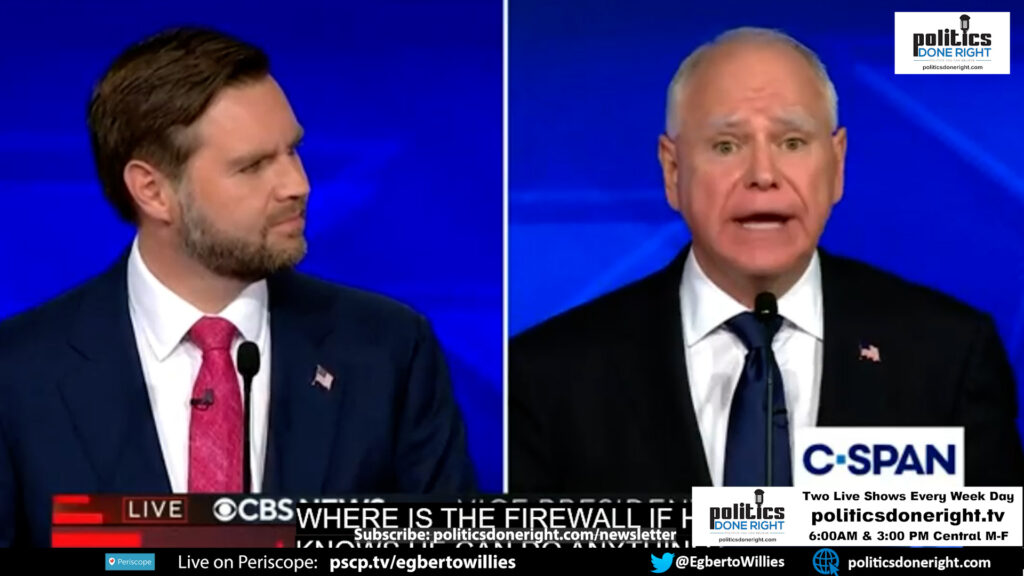Tim Walz won the debate on speaking the truth. For the uninformed, JD Vance likely drew a draw. Vance lost the debate when he could not say Trump lost the 2020 election.
Tim Walz won the debate as JD Vance failed at the truth.
Watch Politics Done Right T.V. here.
Podcasts (Video — Audio)
In a pivotal moment during a recent debate, Democratic Governor Tim Walz seized the upper hand by posing a critical question to Republican Senator JD Vance: Did Donald Trump lose the 2020 election? JD Vance’s failure to provide a straightforward answer highlighted the fundamental tension within the Republican Party, particularly its allegiance to Donald Trump and his baseless claims of election fraud. This exchange underscored Vance’s reluctance to confront the truth and showcased Walz’s ability to expose the lingering dangers of Trump’s hold on the GOP.
Like many Republicans entrenched in Trump’s orbit, JD Vance dodged Walz’s direct question. His refusal to admit that Trump lost the 2020 election mirrors a disturbing trend among GOP leaders. Rather than embracing facts, they pander to Trump’s fabricated narrative of a “stolen” election. This is not simply a matter of political debate—it is an issue of democracy and truth. When elected officials cannot acknowledge an election’s legitimacy, they are undermining the very foundation of democratic governance.
Vance’s response was striking in its evasiveness. Instead of answering the question, he diverted attention to a fabricated controversy, asking, “Did Kamala Harris censor Americans from speaking their mind in the wake of the 2020 COVID situation?” This kind of deflection is emblematic of the MAGA strategy. They turn to conspiracy theories or red herrings when faced with inconvenient truths. Vance’s pivot to a debunked claim about censorship serves only to distract from the core issue: Donald Trump lost the 2020 election, and JD Vance, like many Republicans, is too afraid to say so.
Governor Tim Walz, on the other hand, responded with clarity and conviction. Walz pointed out that this isn’t a debate—Trump lost, and the facts are indisputable. He also emphasized the broader danger of Trump’s influence, particularly how Trump expects unwavering loyalty, even if it means distorting reality. Walz questioned where the “firewall” within the Republican Party is when Trump pushes these false narratives. He reminded the audience of former Vice President Mike Pence’s decision to certify the election results, which makes Pence a pariah within Trump’s circle. Walz’s point was clear: If Republicans like Vance refuse to confront Trump, they are complicit in his ongoing assault on democracy.
JD Vance’s performance during the debate encapsulates the broader problem within the Republican Party. The party has become beholden to Trump’s lies, and figures like Vance are unwilling to break from the former president, even when the stakes are as high as the integrity of American democracy. This dynamic raises significant concerns about the future of the GOP and its role in national politics. If Republicans cannot admit to a basic fact—that Joe Biden won the 2020 election—how can they be trusted to govern effectively and uphold democratic norms?
Tim Walz’s debate handling highlighted his leadership and commitment to truth. In contrast, Vance’s response illuminated his fear of alienating Trump’s base. This exchange is indicative of a broader trend: Republicans who remain tethered to Trump and his lies are prioritizing political survival over the truth. For progressive voters and observers, this moment serves as a reminder of the critical importance of standing up for facts, particularly in an era where disinformation has become a central tool of political manipulation.
Progressives can take heart in Walz’s performance. His direct challenge to Vance revealed the cracks in the GOP’s armor. Despite the performative confidence of figures like Vance, their reluctance to confront Trump’s lies is a sign of weakness, not strength. This is an opportunity for progressives to continue pushing for transparency, truth, and accountability, especially as the country approaches future elections.
Moreover, Walz’s insistence on calling out Trump’s falsehoods aligns with most Americans’ beliefs. According to numerous polls, most Americans accept the outcome of the 2020 election and reject the conspiracy theories peddled by Trump and his loyalists. In today’s political landscape, Walz’s approach—boldly standing for truth in the face of lies—is precisely what is needed.
As Walz stated during the debate, this isn’t about partisanship but safeguarding democracy. The inability or unwillingness of figures like JD Vance to acknowledge reality is a grave threat to the democratic process. Progressives must continue to emphasize the importance of truth, even when it is inconvenient for the other side.
In conclusion, Tim Walz won the debate not because of rhetoric or flash but because he stood firmly on the side of truth. JD Vance’s refusal to admit that Trump lost the 2020 election exemplifies the broader moral bankruptcy of the current Republican Party. It is up to leaders like Walz and the progressive movement to keep fighting for a future where facts, not fantasies, guide the political discourse.

